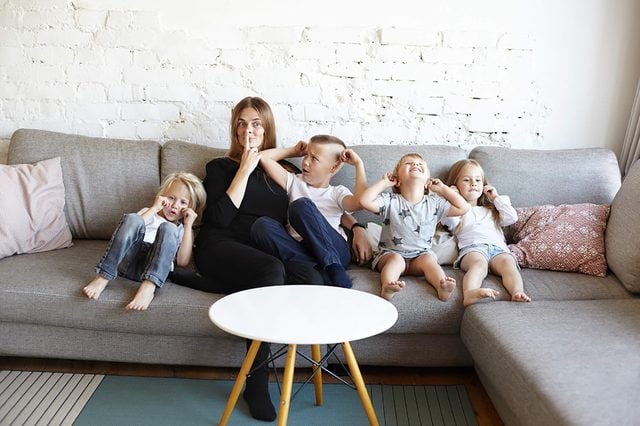Here’s Why Kids Behave So Much Worse Around Their Parents
Updated: Apr. 01, 2022
If it seems like your kids start to misbehave whenever you walk in the room, you're not alone. There's even pretend science to back up your perception.
 Even the best behaved children can turn into monsters when Mom’s in the room. Except, apparently, French children, who are always well-behaved for these reasons. But it took a fake study (originally published in Mom News Daily) to get people talking about why. The faux study, supposedly out of the University of Washington’s Department of Psychology, quickly went viral thanks to its un-scientific-sounding title: “Children are 800% Worse When Their Mothers Are In the Room.” Little surprise because, fake science aside, there’s no doubt the premise is true.
Even the best behaved children can turn into monsters when Mom’s in the room. Except, apparently, French children, who are always well-behaved for these reasons. But it took a fake study (originally published in Mom News Daily) to get people talking about why. The faux study, supposedly out of the University of Washington’s Department of Psychology, quickly went viral thanks to its un-scientific-sounding title: “Children are 800% Worse When Their Mothers Are In the Room.” Little surprise because, fake science aside, there’s no doubt the premise is true.
“Kids push boundaries, have meltdowns, and are so much worse around their parents because they feel safe and secure with their parents,” explained Crystal I. Lee, PsyD, to Reader’s Digest. Dr. Lee is a licensed psychologist with 15 years of experience in the mental health field, many of which have been spent working with children and their parents. “Think about your own behavior,” she points out. “You probably act more put together and formal around strangers because you’re not sure how they’ll react to you. But around your friends and family, you are your true authentic self and feel safe that they love you, even if you’re having an off day. Your kids are the exact same way!”
But providing your kids with a safe space to act out isn’t the only theory: Steve Silvestro, MD FAAP, a pediatrician and host of The Child Repair Guide Podcast gave Reader’s Digest two other possibilities:
- Attention seeking: “Kids will often display more extreme behavior when trying to get something out of us,” Dr. Silvestro explains. “Our kids love us and crave our attention…and even negative attention is better than no attention at all.”
- Our own lack of consistency: “The more interesting reason,” according to Dr. Silvestro, “is that we as parents are more inconsistent with our responses than many other adults in our kids’ lives.” For example, teachers have to take care of many kids at the same time, so as a matter of survival, they’ll adhere more consistently to rules and routines and offer less leeway than parents when it comes to bad behavior. A child who is told to stop doing something three times before the parent finally makes him stop learns that, although sometimes his behavior won’t be tolerated, other times it will be, and this makes the bad behavior more difficult to extinguish.
As for what to do about the “800% worse” phenomenon, Claudia Luiz, PsyD, suggests that we, as parents, embrace the bad behavior, or at least occasionally permit the acting out. “When children allow themselves to behave badly, they’re also allowing themselves to be vulnerable, and we should make room for that because it encourages closeness, security, and strength,” Luiz says. Even so, there are times when we need our kids to behave with at least some measure of decorum, such as when we take them out for a meal.
